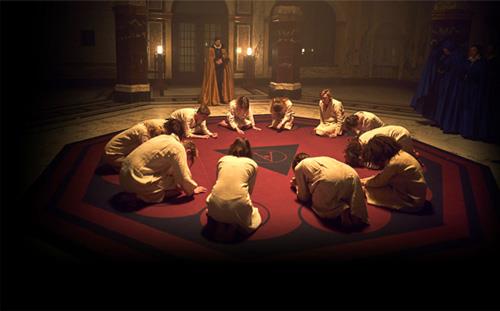
Ares, an eight-episode Dutch thriller from Netflix about a young college student trying to fit in with the "in" crowd, has a simple premise that's much better in the execution than a single-line synopsis would have you believe. Gossip Girl, it ain't.
Rosa is an ambitious medical student from the poor side of town who, through her lively, quick mind, and strong work ethic, dreams of greater things.
The daughter of mixed-race parents, she lives with her mentally challenged, suicidal mother and overworked father, who seems permanently stuck on the night shift at the local hospital.
The family doesn't so much live as survive in a shabby, run-down one-room apartment that overlooks a busy transit corridor with high-speed trains constantly rattling by at all hours of the day and night. Not everyone rides the bicycle to work in Amsterdam, it would seem, despite the national obsession with cycling and the city's hard-earned reputation for being eco-friendly.
In a hypnotic and visually stylish opening hour, Rose clashes with her medical professor, who she accuses of reading from a textbook during a lecture to the class. "I can do that on my own," she snaps, incurring his wrath — and an extra homework assignment for the entire class ("Thanks a lot," her bemused classmates tell her dryly).
An ex-boyfriend who vanished in the middle of their burgeoning relationship suddenly reappears. He's oddly distant and doesn't appear to want to have anything to do with her; furious, she demands to know why he walked away without telling anyone, least of all her. It's obvious they still have feelings for each other, but he's deliberately cold toward her, almost as if he wants to drive her away.
She notices his new circle of friends — older, sexy, well-to-do, and tightly connected to wealth and power.
They notice her over her ex-boyfriend's objections, and before she knows it, she's invited to private, late-night viewings of Rembrandt paintings at Amsterdam's Rijksmuseum, unaccompanied and unchaperoned, just her and her new circle of friends. They're members of Ares, pronounced "arress," a secretive, invitation-only sorority of overachievers from wealthy families. Ares seems more like a cult than a sorority, though, except that this cult is full of leaders, not followers. Money means nothing to them; power comes easily to them, and it's clear from the outset that something is wrong somewhere.
Rosa doesn't care, though. She's ambitious, bright and fed up with being poor. When an older girl asks her, rhetorically, if she's ever wondered how a country as small as the Netherlands, a country just twice the size of New Jersey, became a world power in the age of 17th-century seafaring — during the 1600s, the Dutch Republic was involved in many, many naval wars, as part of their vow to police shipping lanes as far away as Indonesia — she's hooked.
Initiation rituals lie at the heart of nearly all secret societies, and Ares is no exception. Being accepted becomes a singular obsession for Rosa, and her transformation from working-class ugly duckling to royal-in-waiting is stunning to witness.
Ares is visually arresting — the constant allusions to Rembrandt are a tell. The Dutch master's wall-sized The Night Watch is a recurring motif, as is the lesser-known but no less revealing Anatomy Lesson of Dr. Nicolaes Tulp. As a series, Ares is tightly written and consummately well acted. It's dark and disturbing, and yet strangely alluring. Watching it, I was struck by a sudden thought: If Stanley Kubrick had written and directed a TV series, it would look a lot like Ares.
Unlike many promising thrillers, Ares holds up in subsequent episodes, too. I've watched six of eight, as of posting this, and there have been moments when I'm not sure I've seen anything quite like it. What I would compare it to — and I don't say this lightly — is a cross between The Da Vince Code and Eyes Wide Shut. Beautiful at times, and yet frightening.
As with a lot of what comes down the pike from Netflix, with little warning and next to no pre-publicity, Ares is a hidden gem, a thriller with genuine sparkle and sharpness.
Be warned, though. This is not The CW. It's drama for adults, and there are moments as grim as anything you'll see in a Kubrick film. This is a world where student fraternities and secret societies meet, where cruelty and elitism go hand-in-hand, and where those born to power exercise it ruthlessly and without remorse.
Incredibly, Ares has already had a real-world effect. In an essay in the UK Guardian just this past weekend, Ares head-of-development Michael Leendertse drew parallels between his Netflix series and real-world scandals that have torn apart secret societies in the Dutch cities of Utrecht, Leiden, and Groningen, societies with powerful and imperious sounding names like Veritas, Augustinus, and Albertus Magnas.
And the acting is of a serious order. Chances are you've never heard of Jade Olieberg, who plays Rosa, or Lisa Smit, but they could quite easily emerge as the new Noomi Rapace and Sophie Gråbøl.
Ares has the potential to be every bit as influential on popular culture as the original Girl With the Dragon Tattoo or The Killing (Forbrydelsen in the original Danish). It's that good.